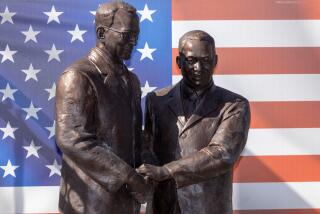Activist and L.A. ‘matriarch’
- Share via
Mary B. Henry, a civil rights activist who helped create the national Head Start program and fostered the rise of the Martin Luther King Jr./Drew Medical Center from the ashes of the 1965 Watts riots, died Friday. She was 82.
She died of natural causes at a local hospital after a long illness, her son Craig Henry said Saturday.
Henry’s lifelong work to provide quality education and social services to the poor was honored by presidents, governors and mayors over more than four decades and left an indelible mark on the community and her name on facilities treating the needy. She served on President Lyndon B. Johnson’s War on Poverty task force that led to the Head Start program that brings nutrition and early childhood education to inner-city children. She was best known for her work catering to local needs as director of the Avalon-Carver Community Center serving South-Central Los Angeles.
She was a tireless force in the development of the King/Drew complex and was said by fellow activists to have been morally crushed by the collapse of the hospital two years ago after a series of medical lapses and patient deaths.
“She believed every day of her life that we can make our dreams a reality for the coming generations, that we have to rise above division and evilness and do good for mankind,” said Southland civil rights activist Lillian Mobley, who described her friend as “the fabric of the community.”
“Every campaign we worked on was important. She put everything into the building of Martin Luther King and losing that hospital was part of the thing that just took her strength away,” Mobley said in an interview Saturday. “She believed in it until yesterday, when she left us.”
County Supervisor Mark Ridley-Thomas, who has known Henry since the 1980s, remembered her as a tireless, effective advocate for quality healthcare.
“One of the reasons I’m working so hard to reopen the hospital is a tribute to the Mary Henrys of our community,” he said. “Her memory motivates me.”
U.S. Rep. Diane Watson (D-Los Angeles) described Henry as “a huge positive presence in our community” and its “matriarch.”
The Charles R. Drew University of Medicine and Science opened the Mary B. Henry Child Development Center in 2002. A telemedicine clinic in the city was named in her honor later that year.
“For me, as an African American woman, she was a very significant role model. They just don’t make these women anymore,” said Los Angeles Councilwoman Jan Perry. “They’d call you out, be your mother, set you straight, remind you of the values you need to have, not just for yourself but for your community.”
“She glued the community together at times like the riots in Los Angeles,” said Willis Edwards, a local leader of the National Assn. for the Advancement of Colored People. “She spoke out for children and healthcare, especially for the Martin Luther King hospital.”
Edwards credited Henry with vital support in the election of Los Angeles’ first black mayor, Tom Bradley, and for pressing politicians to put aside their differences for the good of the community during times of tension, including the volatile aftermath of the Rodney King beating.
Though Henry’s health had been in decline in recent years and she was unable to participate in the current national debate over healthcare reform, she probably could see that the battle of her lifetime was headed toward a successful end, said County Supervisor Zev Yaroslavsky.
“She fought hard for people who were on the margins of society. She lived a full life and made a huge difference,” said Yaroslavsky, who fought for better healthcare alongside Henry for more than 30 years.
She also served three terms with the Compton Unified School District, where she pressed fellow trustees to more aggressively tackle drug and gang problems and to build up poor children’s self-esteem.
Named the Los Angeles Times Woman of the Year in 1967, Henry was also honored by the Los Angeles Urban League, Los Angeles Brotherhood Crusade, National Council of Negro Women and Presidents Kennedy, Johnson and Carter.
Mary Elizabeth Bradshaw was born in Kansas on Aug. 7, 1927, and grew up in Gary, Ind. She moved to Los Angeles in 1958 with her husband, Louis Charles Henry, a welder with whom she had four sons. Her husband and a son, Raymond, preceded her in death.
She is survived by three sons, Louis, Craig and Paul; brother Raymond Bradshaw; sisters Joan Shaw and Geraldine Pye; and five grandchildren.
--
More to Read
Sign up for Essential California
The most important California stories and recommendations in your inbox every morning.
You may occasionally receive promotional content from the Los Angeles Times.














